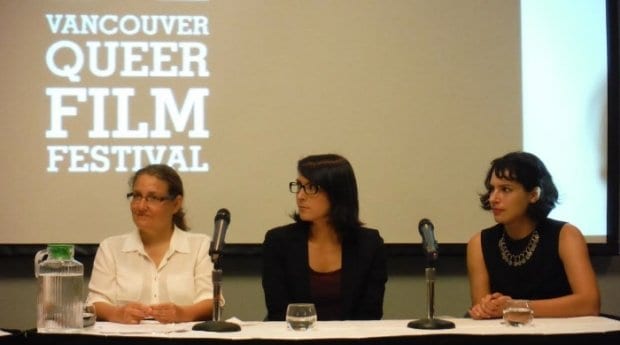Canadian women in film need to get political and ensure that federal taxpayer-supported funds are being handed out equitably, the Vancouver Queer Film Festival’s Gender Equality Revolution panel on women in film heard Aug 18.
Carolyn Combs, executive director of Women in Film and Television Vancouver, says statistics from Please Adjust Your Set — which gathers statistics on women’s participation in the industry — show that 34 percent of producers, 26 percent of directors and 21 percent of writers in the Canadian industry are women.
“It’s really hard in film in BC right now,” Combs says. Those figures are lower in the west, are better in Ontario, but plummet to zero in Quebec, she adds.
Combs says of the 139 feature films made in Canada in 2010 and 2011, only 20 percent were directed by women, with 21 percent having women screenwriters. She says gender balance is generally good in entry-level positions but shifts toward men when it comes to decision-making positions. She says the situation is worse in television production.
Combs was joined on the panel by director Sydney Freeland (Drunktown’s Finest) and Iranian-American filmmaker Desiree Akhavan (Appropriate Behavior), whose films are being screened at this year’s Queer Film Festival.
Akhavan, whose work premiered at the Sundance Film Festival, says male directors have encouraged her to go ahead and make a “shitty” film just to keep going. “A female director would never say that to me,” Akhavan says. “My career would be ruined. I’d be in director jail.”
Both Freeland and Akhavan say they can get meetings with film backers but add it can be difficult for women to move past that point at times.
“They ask if you just want to make LGBT movies,” Freeland says. “What they are asking is, ‘Are you going to move beyond this?’” But, Freeland cautions, there is a difference between making films and making films with an agenda. “If that’s my agenda going into it, I’m just creating a soapbox.”
“There’s a reason we choose to make movies,” Akhavan says. “I want to lose myself in the story and the characters. It’s hard to do that when you have an agenda . . . or are making propaganda.”
But, both say, filmmakers should get used to rejection.
Filmmaker Elaine Carol says the system is geared to mediocre film and is dominated by white men. She says she no longer bothers pitching work to Telefilm Canada, the federal cultural agency devoted to the development and promotion of the Canadian audiovisual industry. “I know the answer is going to be no.”
“My films would not be shown if it weren’t for this film festival and DOXA,” she adds. “The system here works completely against women filmmakers; I’m coming up against wall after wall.”
And, says Akhavan, nuanced films are hard to sell. “I think it’s about pitching,” she says. “I know women in my life prefer a movie with nuanced characters, which is not pitchable. It’s a superficial industry; it’s not nuanced.”
“If 50 percent of the population is not getting their films made, just think about how many stories are not being told,” Combs adds.
So what can people do about that, the panel was asked.
“Canadians need to get political,” Combs suggests, specifically mentioning Telefilm Canada. “That’s taxpayer dollars going to film production, and they’re not going to 52 percent of the population,” she notes. “We have to start demanding that.”
Akhavan and Freeland acknowledge there is a move to internet-based film, but they stress filmmakers first need money to create their art as well as promotion. “You can’t just put it on the internet and expect people to watch it,” Akhavan says. And, she adds, there is the issue of attracting people to watch indie film when those online are busy looking at “cat pictures and videos of people who light their farts on fire.”

 Why you can trust Xtra
Why you can trust Xtra


